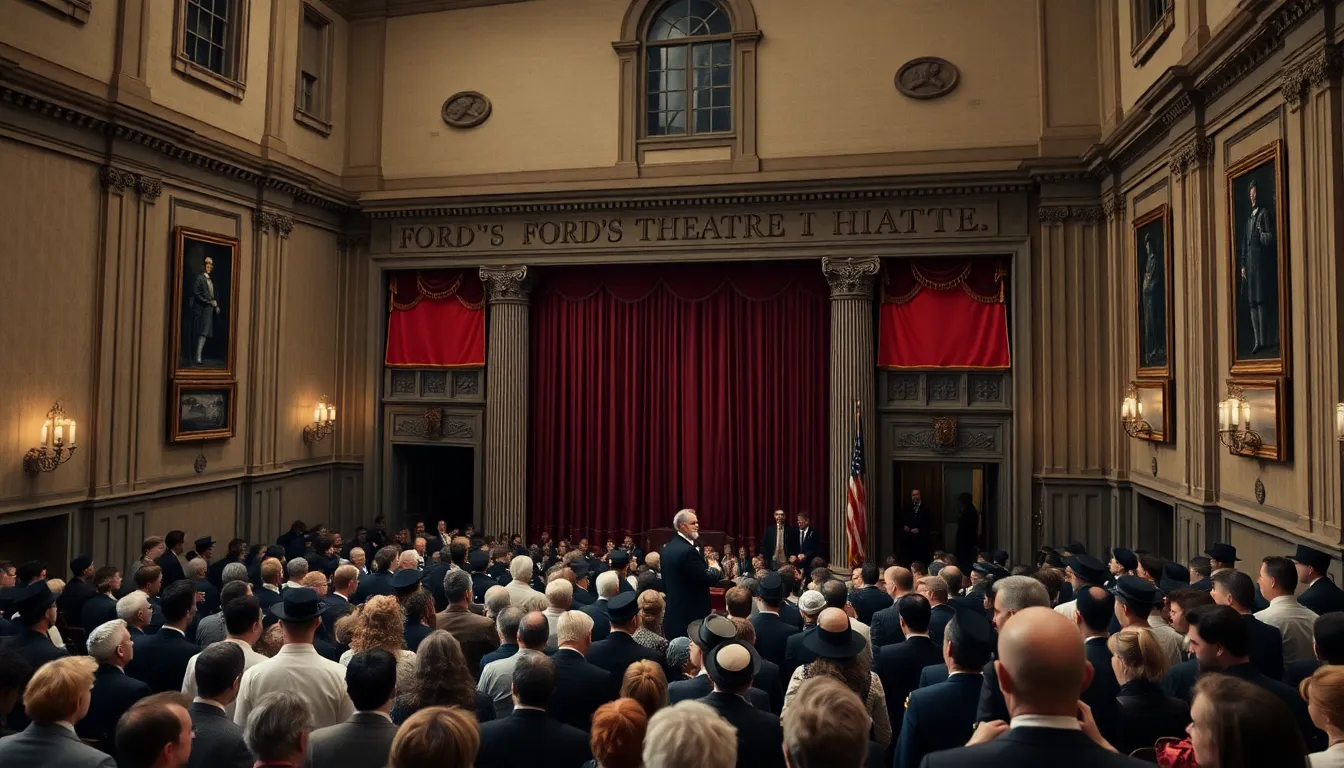Abraham Lincoln, the man who famously led the nation through its Civil War and delivered the iconic Gettysburg Address, met an untimely end that shocked the world. But just when did this towering figure of American history take his final bow? If you think it was sometime during a particularly heated debate or while wrestling a bear, you might want to brush up on your history.
Table of Contents
ToggleHistorical Context of Lincoln’s Presidency
Abraham Lincoln’s presidency unfolded during a tumultuous era marked by division and conflict. His leadership came at a critical moment in American history, influencing the nation’s future.
Key Events Leading to His Assassination
The onset of the Civil War in 1861 proved pivotal. Secession of several Southern states catalyzed a conflict centered around slavery and states’ rights. The Battle of Gettysburg in 1863 marked a significant turning point, reflecting intense military engagements. As Lincoln delivered the Gettysburg Address, he redefined the purpose of the war. The Confederacy’s ultimate surrender in April 1865 shifted national sentiment. Only days after, celebrations turned into tragedy with Lincoln’s assassination on April 14, 1865. His assassination reflected deep societal divisions and the lingering impacts of the war.
Lincoln’s Major Accomplishments
Lincoln’s legacy encompasses several key accomplishments. The Emancipation Proclamation in 1863 was revolutionary, declaring freedom for enslaved individuals in Confederate territories. His advocacy for the Thirteenth Amendment led to the abolition of slavery across the nation. Furthermore, he strengthened the federal government’s role, ensuring unity and purpose during crisis. The establishment of a national banking system helped stabilize the economy. Lincoln’s commitment to preserving the Union remains a cornerstone of his historical impact. His speech at Gettysburg underscored a new vision for the nation, prioritizing equality and human rights.
The Assassination of Abraham Lincoln

Abraham Lincoln’s assassination marked a significant moment in American history. On April 14, 1865, he was shot by John Wilkes Booth at Ford’s Theatre in Washington, D.C.
Date and Location of the Assassination
Lincoln’s assassination occurred on the evening of April 14, 1865. Booth shot him at approximately 10:15 PM. The theater was packed with audience members watching the play, “Our American Cousin.” After the attack, Lincoln was transported to a nearby boarding house. He succumbed to his injuries the next morning, April 15, 1865. This tragedy unfolded just days after the Confederacy’s surrender, making the timing even more poignant in American history.
The Assassination Conspiracy
The assassination stemmed from a broader conspiracy to eliminate key government figures. Booth envisioned killing Lincoln along with Vice President Andrew Johnson and Secretary of State William H. Seward. Several conspirators, including Lewis Powell and George Atzerodt, were involved in the plot. After the assassination, Booth fled Washington and was pursued by Union soldiers. The conspiracy aimed to destabilize the federal government in its moment of victory. Ultimately, Booth’s actions and his collaborators’ plans failed, leaving an indelible mark on the nation.
What Year Did Lincoln Die
Abraham Lincoln died in 1865, a year that marked a pivotal moment in American history.
Significance of the Year 1865
The year 1865 held great significance for the United States. This year saw the end of the Civil War, a conflict that deeply divided the nation. April 9, 1865, marked General Lee’s surrender at Appomattox Court House, signaling the Union’s victory. Just days later, on April 14, Lincoln was assassinated, highlighting the fragility of peace. His death came at a time when the nation sought to heal from years of bloodshed. The enactment of the Thirteenth Amendment, abolishing slavery, further underscored the transformative nature of 1865.
Impact on American History
Lincoln’s assassination dramatically impacted American history. It disrupted the nation’s recovery efforts following the Civil War. His leadership and vision for reunification faced a sudden void. The shock of his death fueled a wave of national mourning, uniting citizens in grief. Moreover, his passing altered the course of Reconstruction, as the new president, Andrew Johnson, struggled to navigate the turbulent political landscape. The conspiracy to assassinate Lincoln aimed to eliminate those advocating for equality and healing. This event profoundly influenced American culture and politics, shaping the nation for generations.
Legacy of Abraham Lincoln
Abraham Lincoln’s impact extends beyond his life, deepening America’s understanding of leadership, unity, and equality.
Influence on Future Presidents
Future presidents often cite Lincoln’s principles as guiding lights in their own leadership. His ability to communicate effectively remains a benchmark for politicians. Consider Franklin D. Roosevelt, who invoked Lincoln’s legacy during times of national crisis, emphasizing unity and resilience. Barack Obama frequently referenced Lincoln’s commitment to inclusivity and democracy, inspiring a generation with his call for hope and change. His example taught leaders the importance of empathy, particularly during turbulent times.
National Commemorations and Memorials
Numerous commemorations honor Lincoln’s contributions to the nation. The Lincoln Memorial in Washington, D.C., stands as a testament to his enduring legacy, attracting millions annually. This monumental structure features a seated statue of Lincoln, symbolizing strength and resolve. Each February, people celebrate Lincoln’s birthday, reflecting on his life and achievements. Educational programs and events centered on his life foster awareness about civil rights and equality, reminding citizens of his significant impact. The dedication to preserving his memory ensures that future generations learn about the principles he championed.
Abraham Lincoln’s death in 1865 not only marked the end of a pivotal era but also left an indelible mark on the nation. His assassination came at a time when the United States was grappling with the aftermath of the Civil War and striving for unity. The shockwaves from his death reverberated through American society, altering the course of Reconstruction and shaping future political landscapes.
Lincoln’s legacy continues to inspire leaders and citizens alike, reminding them of the importance of unity and resilience. His contributions to civil rights and democracy remain relevant, ensuring that his ideals live on through ongoing discussions about equality and justice. The memory of Lincoln serves as a guiding light for generations, affirming his status as one of America’s most revered leaders.





